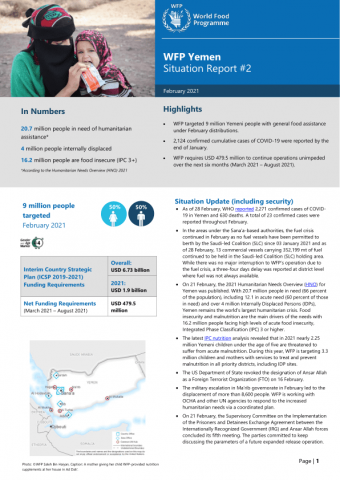Yemen Food Security Outlook Update, December 2020


Food price increases and delayed salary payments spark public protests in southern areas
Key Messages
Ongoing conflict and political instability are driving an increasingly concerning macroeconomic situation in Yemen. Throughout 2020, continued depreciation of the currency has resulted in further food price increases in many areas. Crisis (IPC Phase 3) outcomes are widespread, even in the presence of significant humanitarian assistance in many areas. In widespread areas where Crisis! (IPC Phase 3!) outcomes are expected throughout the projection period, anticipated significant levels of assistance is likely to prevent more severe outcomes. In northern Hajjah and Amran, deterioration to Emergency (IPC Phase 4) is likely in the February to May 2021 period as the lean season progresses. While not the most likely scenario, Famine (IPC Phase 5) would be possible in the event that food imports are significantly disrupted for a prolonged period of time.
From October to November 2020, the exchange rate in southern governorates depreciated by a further 2.8 percent from October to November 2020, to reach 801 YER/USD according to FAO. This was largely driven by rapid depreciation in Aden and other southern governorates in the last week of November. Though the exchange rate in Aden appreciated slightly following the announcement of a renewed Riyadh Agreement on December 10, it has since continued to depreciate, reaching 860 YER/USD as of December 17 according to key informants. Driven by the deteriorating macroeconomic situation, recent protests in Aden, Lahij, and Ta’izz illustrate an escalating situation as people struggle to access income and food prices rise. In northern governorates, the exchange rate remained stable in November on average.
While not the most likely scenario, according to multiple media sources it remains possible that the United States issues a “Foreign Terrorist Organization” designation pertaining to northern authorities in Yemen. This would impact commercial activity—including potentially imports and banking—and would accelerate the pace of macroeconomic deterioration. Additionally, if no official allowance is made for humanitarian operations, this could significantly impact the humanitarian response in Yemen, as humanitarian organizations with western ties may cease operations out of fear of legal repercussions. For an analysis of the impacts of such a designation on food security outcomes, see the “Events that Might Change the Outlook” table at the end of this report.

Aden — Yemen Airways has announced new updates to its ticket cancellation (VOID) policy, introducing financial penalties on travel agents in…

Geneva – The United States announced that Yemen will not be among the countries benefiting from a new $2 billion funding pledge for United Na…

Paris — The French humanitarian organization Acted announced that it has delivered cash assistance to nearly 89,000 people affected by displa…